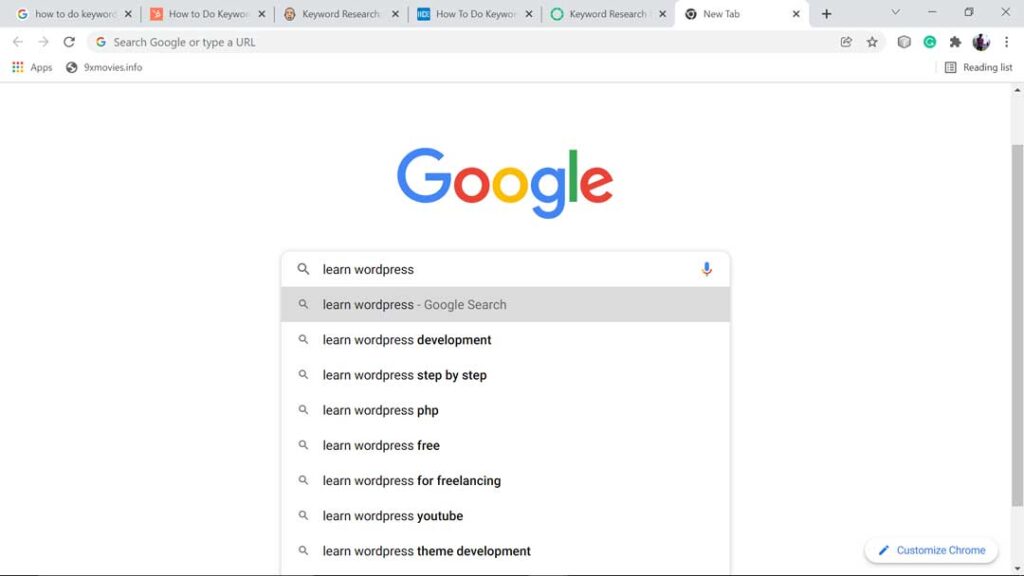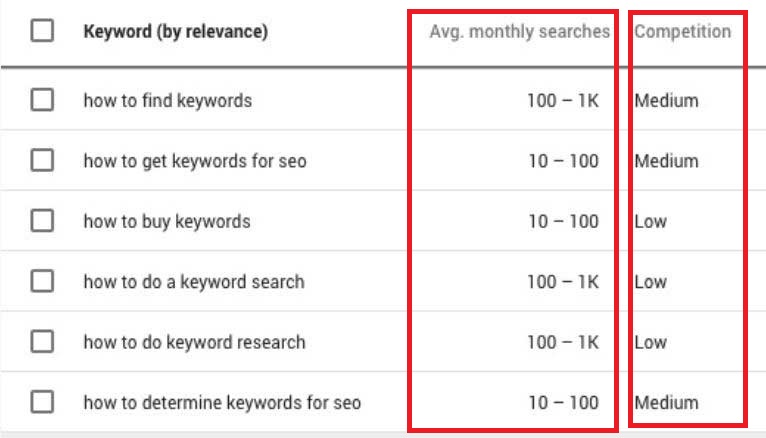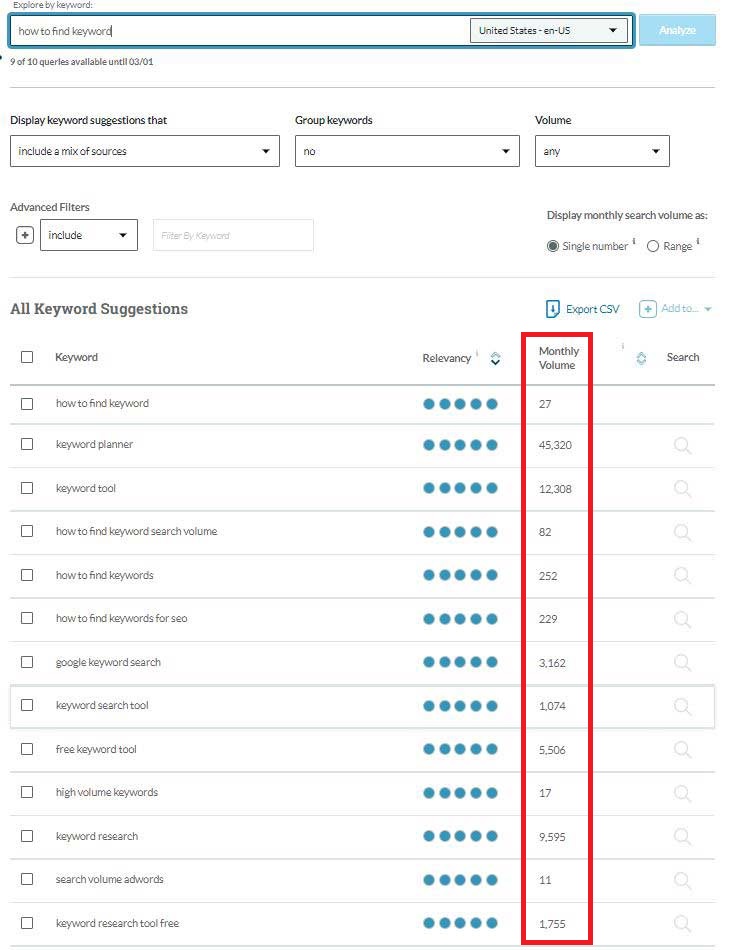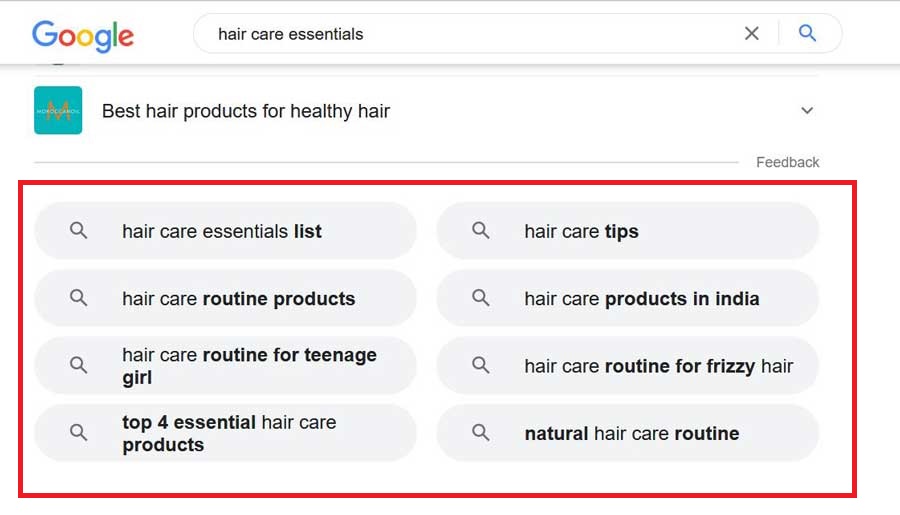Keyword research is the first step to planning an online campaign. Any form of online content you are about to create will be started by doing keyword research.
This gives you an insight into what your target audience is searching for. You can then move ahead and learn what you are chances to rank on search engine result pages (SERP) for those keywords.
Without knowing what you are targeting how can you create a campaign, write a blog, target phrases, or know what type of content creation approach you should take. Keyword research is the first step ahead of getting the answers to all these.
What is Keyword Research
Keyword Research means finding terms and phrases that people use while conducting a Google search. Finding terms that people are using while searching for any product, service, or information and using them in your campaign and content makes for the more relevant search results.
Keywords can vary from a single term to a few words. Longer keywords with more words are called Longtail Keywords. You need to focus on both types and use them accordingly to reap better results.

For example, “Learn WordPress” is one keyword, only the term “WordPress” is another Keyword that the user searched for. Below there are also many related suggestions appear which are different search terms used by the people.
Keyword Research doesn’t mean just finding one Keyword around the category. It means to find all the search terms that can be used while working on any category’s content or campaign.
Importance of Keyword Research
Keyword Research is the first step you must take while starting a campaign, writing a blog, or working on any niche website. Keyword Research will draw a virtual roadmap for you on how you wanna approach the content. A content strategy is important when you are writing on any topic. After doing the Keyword Research you can understand the approach you want to take and have a clear strategy on what your audience is looking for.
Any internet marketer or content writer must understand that you are not going to the visitors, the visitors are coming to you through your website or blog or any other medium you are working on.
Keyword Research will give you an insight into what the users are searching for. After knowing what is being searched on any particular topic you can create your content or marketing strategy around the same. People use Keywords to find answers for their queries. And any internet marketer who provides the most relevant answers to any particular query ranks the highest in the SERP.
Any SEO expert would do Keyword research first before writing any piece of content. You cannot master the art of SEO without knowing how to do Keyword Research. After you know what your audience is looking for, you can create your website, content strategy, ad campaigns, etc.
We will learn about Keyword Research tips and tools in this blog that can make your task a lot easier. The major benefits you will reap after doing Keyword Research are summarized below:
A peek into Marketing Trends
By doing extensive Keyword Research you will get an insight into ongoing market trends and related search terms being used. You can then create your content around your research that can turn out to be more relevant to the search query.
Traffic Growth
As you identify the keywords people are searching for in your niche, then you can move ahead with the content creation around those Keywords. This will help you be ahead of your competitors and through relevant topics and good content, you can rank higher in the SERP.
Customer Acquisition
By creating relevant content for web browsing you will get more traffic to your website. Through increased traffic, you can target customers that are looking for your business and services.
How is Keyword Research done?
Now you know what is Keyword Search and the importance of it. Let’s jump to the next part to get the answers to the most important question, How? How do we do Keyword Search which will help in campaign and content creation and then turn into results? I will discuss this in detail.
Step 1:
Brainstorming: Make a list of relevant topics and important related terms
To kickstart the process first make a list of relevant topics for which you want your page to rank. You must know all the similar terms which can be used related to your topic. You will come up with a few topics or similar headlines for which you would like the webpage to rank for.
– Create an excel sheet and start to write each term.
– Start brainstorming as many related search terms for your webpage you can think of
Sometimes this is the toughest part to get started. People start to not down many broad terms while listing related search terms.
For example, if you write Food, this is something too broad and impossible for the search engines to rank a particular type of hotel so it will just show up any random hotels around. You must write terms that are narrowed down or say are specifically targeting one niche or product. So if you write Mexican food restaurant, this will narrow down the search to this particular category and increase your chances to rank higher in the search engine result pages (SERP).
By this process, you will have a few terms noted down and then you can move ahead to do the competition analysis and find more terms through different processes.
Step 2:
Focus on Long-Tail Keywords
Long-tail keywords are often longer and more specific than generic header term keywords. As people start doing keyword research they focus more on the general head terms.
For example, targeting for the search term “Restaurant” is more of a head keyword term and is too broad for the search engine too. A keyword like “Thai Restaurant in New York” is more narrowed down and easy to rank in the search engine.
Long-tail keywords are longer and narrow down the search. The head keywords are already being taken by large businesses in most cases. This makes it tough to rank for these singular term keywords. On the other hand, Long-tail keywords get a less amount of search traffic but are also less competitive.
Long-tail keywords make it easier to rank for a few topics and then you can slowly rank higher for head keywords too as your domain authority grows.
– In the excel sheet you made in the first step, write the head terms first in one column. Then in the second column write the relevant long-tail keywords.
– This will help your website gain authority for narrowed-down search queries and rank in the SERPs. Slowly you can gain domain authority and get to rank for head terms as well.
Step 3:
Get more Keywords with Keyword Tools
Through brainstorming and digging a little deeper into the long-tail keywords you will have the first list of your keywords ready in your sheet. Now it is time to get more related terms that are already being searched by users.
Using keyword tools is the way to do this. There are numerous keyword suggestion tools available for you. You will just need to put a term for which you are looking for similar keywords. The tool will throw a ton of related keywords for you. The best part is that with a few tools you can get the estimated search volume of a particular keyword.
Search volume is a key term that you must look into. The estimated search volume for any keyword means that the keyword is being searched “n” a number of times on a monthly basis. Here “n” stands for “estimated search volume”. This data will help you understand how much that keyword can be competitive and help you make strategies to rank for them.
A few of the most popular keyword tools that you can use for yourself are:
- SEMrush
- Ahref
- Ubersuggest
- Google Keyword Planner
- Moz
- Keyword Everywhere

Above is the screenshot of keyword research done on Google Keyword Planner. You can clearly see that the tool is suggesting many related keywords for the same search topic. There is a column that shows the monthly search volume of the particular keyword and another column shows the level of competition for the same.
As you know the internet has an abundant amount of information on many similar topics and it is tough to rank higher easily by beating the top competitors. By doing keyword research like this you can know which long-tail keywords are easy to target and also with a higher search volume. With good content around those targeted keywords, you can rank higher in the SERPs.

This other screenshot is from the Moz keyword tool. This also gives you a ton of similar keywords with the estimated search volume to make your task easier. By doing keyword research using these few tools and getting the data right in your sheet, you can definitely find the right approach to your content creation.
Step: 4
Use Google’s “related to” search suggestions
Google searches related to suggestions are another cool way to find more relevant keywords. When you make any Google search, the search engine lets you know the similar searches people are making on your topic. This can help you out in knowing the mindset of searchers. Through this, you can plan your content accordingly and this will give you a boost.

This is google helping you that “people are already searching for these terms in large numbers”
These terms will be your bonus added to your keyword research list. You can get more topic ideas if you are into any particular niche as well as you can create content that people are searching for by targeting these search terms. Remember that the people are coming to your website so the content must be in a way that attracts them.
Step: 5
Understand User Search Intent
User Intent is the foremost factor that the Google search engine revolves around. Google wants to give search results which are fulfilling the requirement of the users. The whole SEO strategy revolves around this fact. The answers to any query which gives the most reliable answers to the users’ search query will always rank higher.
Google tracks this by the time people spend on your webpage, how is the experience, did they find their answers and come back to visit again or do they share the links on other platforms. The search engine revolves around the fact that users want answers to what they are looking for. They want the most reliable.
To take the face value of a Keyword and create content is wholly different than understanding what people want to know when they type those queries. You must attract visitors by your quality of content that is answering the queries of the users. The intent behind the search is extremely important to your ranking factor.
For example, you have made a search query as “Pet Care Essentials”. This has a lot broader perspective. Is the user looking for pet care products to buy? or are they looking for guides on how to nourish their pets at home? This one search can have many meanings. If your content strategy is targeting only one of these factors then you should use relevant keywords for the same. If you are creating content for products then you must mention keywords related to the products and also the generic search terms.
This is how User Search Intent defines how your content strategy should be. You must be looking to answer the questions of the users. Users may think of many different answers to the questions they are asking for. Your answers should be targeted to your particular niche and keywords focused on the same intent.
How to Choose Keywords for your website?
Now you will have a list of all the relevant keywords for your topics noted down in your excel sheet. After collecting the Keywords you must know how to apply those keywords in your content. There is a list of a huge number of keywords that you have collected but you cannot use all of those on your website. You need to now filter the keywords as per the user intent and your target audience. Let’s learn how to do that.
Check the Monthly Search Volume
Look at the data you have collected closely. Start to filter the keywords based on the monthly search volume data. You don’t want to target keywords that have a search volume under 50. you will be trying to rank in too sallow water. There have to be related searches made in order for your to rank.
Use Google Keyword Planner for collecting and analyzing this data. This is a free tool that will give you enough data for your keywords. You can also use other tools named above for the same. It will be better if you check the data using a couple of tools and gather the data.
Determine your mission
After doing the User intent analysis you will know that there is more than one result for the same keywords. Note down all the ways Google can answer for a particular search query. Focus on the aspect of the answer you want to present to the users. You cannot cover all the answers for a keyword, so you will need to determine what your website is about and what answers you will provide the users.
The focus of your website should be doing SEO strategies that will work and help you rank for your niche. The correct process of keyword research will help you reach there. You must analyze your competitors too. See what your competitors are doing, what’s working for them, and where they lack.
When getting into a large competitive niche, you need to start small. Get your content strategy right and focus on winning in a few of the topics. Once your domain authority grows with the few pages ranking higher, you will slowly start to move up the rank for larger competitive topics too.
Focus on mixing the Long-tails keywords and head terms
From the data take out a few of the important long-tail keywords which have a significant amount of search volume for you to target. You cannot compete directly for the head terms as it is extremely tough to rank for these due to big websites with the highest domain authority usually ranking for them.
Create data with a mix of head terms and long-tail keywords. The long-tail keywords will help you win the ranks in the SERP faster and the head terms will allow you to rank up for those terms as the domain authority grows of your website.
Ranking for long-tail keywords is more beneficial too. For example, there are two different searches made:
- How to make WordPress website
- WordPress
Out of the above two which keyword is tough to rank for? Obviously the 2nd one. But the people searching for just WordPress may be more qualified than you and their search intent will be too broad. It will be easier to rank for the 1st keyword. Someone is looking to learn about the above and the audience for the same is easy to target.
You surely want to win first for some keywords rather than losing in all the keywords. For the same reasons target the long-tail keywords and have a healthy mix of head terms in your website. This will help you rise to the ranks after you have ranked for some terms.
Analyze Search Reports of your website
The search reports of your website will give you a great insight into what’s working and what’s not. This will help you know what your user is looking for more closely. Through this, you will get the data and know which strategy to follow for content creation.
Use tools like Google Search Console to get your website user insight. Utilize the users’ data to meet your user’s expectations. This means you will be directly listening to your customers and giving them what they want.
Always keep in mind that you are creating content and information for the users to benefit from. The user wants to go where they will find answers, and where users find answers Google ranks those websites above in their search engine result pages.
Start Creating your webpage
After you have done all the research and planned out your keyword strategy you can move to the next step of creating the content for your page. There is no keyword that is best, there are just highly searched terms and low searched terms. So remember all this learning and plan out your content accordingly and move ahead.
Keyword Strategy will be the first step in your page being SEO optimized. This will let you shape your webpage content in a way that is optimized for the search engine to rank higher. Keep in mind that you are creating content for your visitors not for yourself. You will be answering what the users will query.
The above steps will help you be ahead in the Keyword research game. Keep re-evaluating the keywords on your website from time to time. As your website will gain authority with time then you will be in a position to rank for highly competitive keywords and head terms too.


